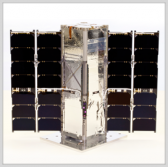 Johns Hopkins University Applied Physics Laboratory has developed a CubeSat designed to collect the Earth’s radiation imbalance measurements for use in climate change predictions.
Johns Hopkins University Applied Physics Laboratory has developed a CubeSat designed to collect the Earth’s radiation imbalance measurements for use in climate change predictions.
Johns Hopkins APL’s Radiometer Assessment using Vertically Aligned Nanotubes CubeSat is one of the seven small-satellite payloads that took off on Nov. 11 aboard the United Launch Alliance-made Atlas V rocket, APL said Tuesday.
Atlas V lifted off from Vandenberg Air Force Base in California to bring into orbit the Lockheed Martin-built WorldView-4 satellite, which will join DigitalGlobe’s satellite constellation to collect commercial satellite imagery.
Blue Canyon Technologies developed RAVAN and oversees the operation of the CubeSat for APL.
RAVAN has an L-1 Standards and Technology-built radiometer that works to measure the strength of radiation that Earth emits across the entire energy spectrum.
NASA’s earth science technology office at Goddard Space Flight Center in Maryland funded the development of the APL CubeSat.




